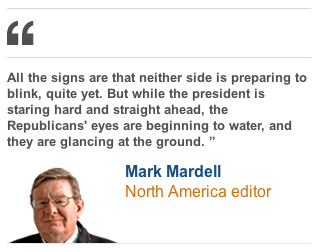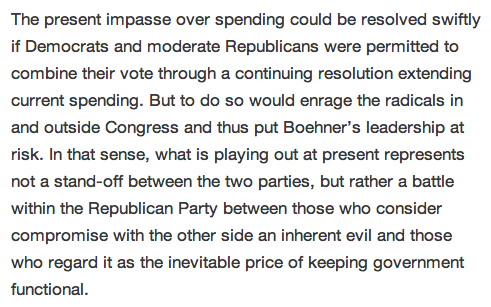On Monday I was asked to provide ‘expert comment’ on the US government shutdown and said:
“The US government shutdown appears dramatic but is not without precedent. For President Obama, like President Clinton in the mid 1990s, the reasons for the shutdown are political and focus on debates about the funding of federal agencies, spending priorities and the overall budget. In particular, Obama faces opposition to the Affordable Care Act, dubbed ‘Obamacare’ by its detractors. Essential workers (e.g. those working on nuclear security and air traffic control) are still doing their jobs, but some 800,000 ‘non-excepted’ government employees have been sent home. For government departments dealing with housing and the environment, this means that over 90% of staff are not at work, in contrast to the Department of Homeland of Security’s 14%. President Clinton’s shutdown lasted a record 21 days. President Obama will be hoping for a swifter resolution than that, not least because the US will reach its debt ceiling around October 17th, preventing the Treasury Department from borrowing the money needed to pay for existing spending commitments. But, for now at least, it is one crisis at a time.”
Well, the two different crises have coalesced rather quicker than they might have done as all eyes have turned to face the impending debt ceiling and the now very real risk of a US default.
At this stage I would strongly reiterate the political nature of the current crisis. When the shutdown began Texan Republican Senator Ted Cruz had a simple message for his party colleagues in both houses:
Three days later and that metaphor is holding, as the BBC’s North America Editor Mark Mardell notes:
As Dr Adam Quinn, who spoke at the Centre for international intervention last semester, put it in his excellent analysis of GOP infighting:
This is, therefore, a “battle for the soul of the Republican party”, as much as it is a stand-off between government and opposition.
There are, then, more than two groups who could potentially blink first, with more ‘radical’ Republicans desperately hoping Democrats make concessionary moves before their more moderate GOP colleagues reach out across the aisle.
In the (fictional) West Wing, Arnold Vinick noted that, were this Europe, the Republican Party would be three parties, not one. Right now, what we are seeing is as much a story of the GOP’s internal politics as it is the resolution of a crisis generated by a two party system.
But that doesn’t mean the Democrats are bystanders. Majority leader Harry Reid has gone so far as to suggest his counterpart John Boehner is being held to ransom by the GOP’s “banana republicans”…
Dr Jack Holland is Lecturer in International Relations. His new co-edited book ‘Obama’s Foreign Policy: Ending the War on Terror’ was published this week. His co-editor Dr Michelle Bentley will give a research seminar at the Centre for international intervention on November 6th.



